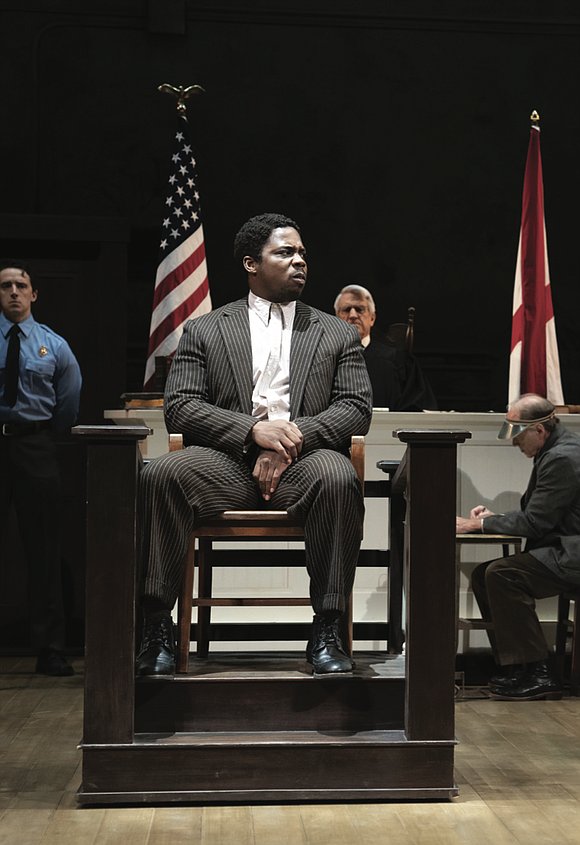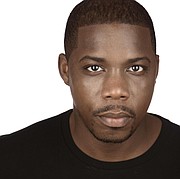Yaegel T. Welch has long carried ‘Mockingbird’ role in his head
George Copeland Jr. | 2/29/2024, 6 p.m.

It was the power and value of performance that first inspired Yaegel T. Welch to take to the stage. Growing up, he saw the arts as a way to express himself in a world that didn’t always know how to connect or communicate with him.
“When I was a kid, I would try to communicate, and I felt like I wouldn’t be heard or understood,” Mr. Welch said. “But when I could put things into the artistic mediums like poetry or storytelling ... people really understood where I was coming from.
“For me, that just seemed to be a natural fit for my life.” Mr. Welch took his first major steps toward acting during his junior year at John W. North High School, when he auditioned for and earned a part in its theater program with a monologue from Athol Fugard’s play “My Children! My Africa!”
Now fully committed to theater, Mr. Welch would go on to earn a bachelor’s in theatre arts from Morehouse College, and a master’s in acting from Brandeis University and The George Washington University Academy for Classical Acting.
Once out of college, Mr. Welch moved to New York, where he bounced between work inside and outside of acting for over a decade, including a return to “My Children! My Africa!” as one of his early roles, off-Broadway productions of “Royale” and “Fly,” and appearances in TV shows like “The Blacklist” and “Madame Secretary.”
Now, Mr. Welch is entering his second year playing Tom Robinson in the Broadway adaptation of Harper Lee’s “To Kill a Mockingbird” on a nationwide stage, helping to bring its story and characters to audiences in Richmond and across the country as part of its national tour.
“It’s a role that I’ve always known in the back of my head, if it ever came, I was right," Mr. Welch said.
It was also a role that Mr. Welch has been connected to for years, from studying the performance of Brock Peters in the film adaptation during his time at Brandeis to earning his union card at the New Repertory Theatre for his work on a separate version of the play in the Boston area.
Mr. Welch joined the Broadway adaptation in 2019, after it first debuted in 2018 with its initial cast. Mr. Welch, who also debuted on Broadway in 2018 with “The Play That Goes Wrong,” was busy at the time, but he was determined to be a part of the production.
The week leading up to getting a role in the play, after Mr. Welch auditioned for the part, was a stressful time. He recalls lying in bed at home, depressed in the hours before his part was confirmed, wracked with worry that he had missed an opportunity and lacking any other work he could rely on.
The notification soon came through, however, and the joy Mr. Welch felt at being chosen to be an ensemble member and understudy for Tom Robinson is still clear all these years later.
“I was so excited,” Mr. Welch said. “I was thrilled I was gonna get to do something so relevant.”
The relevancy of “To Kill a Mockingbird” as a story is something Mr. Welch has seen evolve since he joined the production and the play began its national tour in March 2022, as awareness of and outcry against racial injustice changed the audience’s relationship to the story.
The COVID-19 pandemic and the many instances of police brutality and lack of accountability or justice seen in recent year has, in Mr. Welch’s experience, given “Mockingbird” a renewed place in society and culture. It’s a far cry from the initially “nostalgic” approach to the play he saw audiences take when it first began.
“I think it gives voice to a situation that we know is happening that we sort of have swept under the rug,” Mr. Welch said, “but in recent times with George Floyd and Trayvon Martin and Breanna Taylor and Tamir Rice, Eric Garner, there’s so many instances where young and old people of color have died at the hands of the law unjustly.”
“It’s an important story and it’s nice to go around the country telling an important story that means a lot to people who are both black and white and everything in between.”
As Tom Robinson, Mr. Welch is given an elevated space to help tell that story. In comparison to the original novel and other adaptations, Tom Robinson’s tragic role in “Mockingbird” is expanded, thanks in part to a script that makes the character’s trial and death a more central point in the story.
Tom Robinson’s life and story also now serves as a fulcrum for change for multiple characters in the story, including its most famous, Atticus Finch. It’s a role that carries deep responsibility for Mr. Welch, who says the names of those lost to racial injustice before performances as part of his preparation for the role.
“I try to put their names out there in that universe, on that stage, in the air, because it’s not just a fictional tale,” Mr. Welch said. “It’s real, and it sort of grounds me in what the purpose of this is.”
“It gives me purpose every night, honoring people that have actually died like this in real life.”
The intense schedule of “Mockingbird’s” national tour means Mr. Welch’s life outside of the play is less of a focus for him, as he has to balance travel across the country and performances with promotional work like press interviews and school appearances.
However, Mr. Welch does have plans for what may come next when he moves on from “Mockingbird,” including long-term work with a network TV show, writing a one-person show and a less-demanding theater schedule.
Across much of Mr. Welch’s creative ambitions, including “Mockingbird,” is a desire to make a meaningful social impact and share honest truths with the world. And for those who may be on the fence about seeing the play, Mr. Welch hopes they take the chance to see it and be inspired to make a meaningful impact as well.
“You’re going to see a story that yes, it seems like it’s heavy by nature,” Mr. Welch said. “But no, it’s actually a coming of age story of a Southern family and how they’re made better and more whole after this tragic experience.
“I think this story is about solving what’s unjust, and I would love for people to leave with a sense of awareness about injustices, and how they are going to help eradicate them.”
“To Kill a Mockingbird” will run through Sunday, March 3, at Altria Theater at 6 N. Laurel St. Tickets can be purchased at broadwayinrichmond.com/show/to-kill-a-mockingbird.







